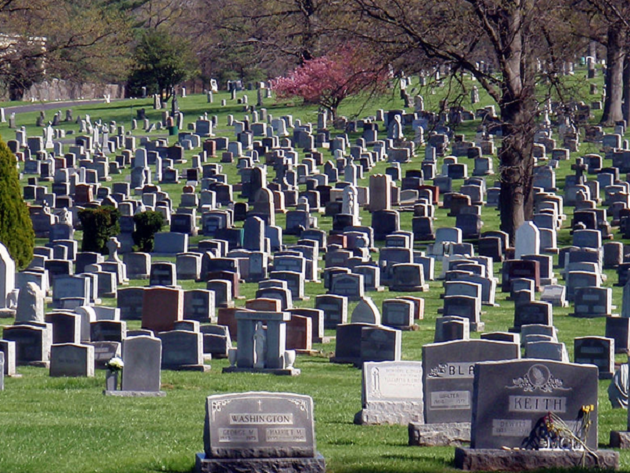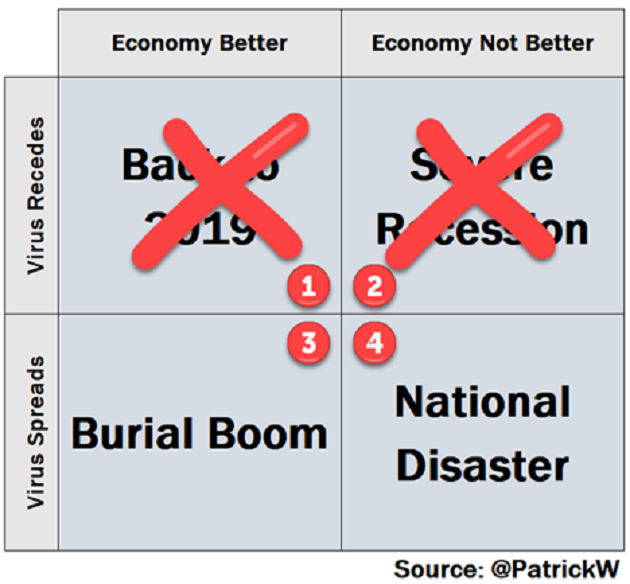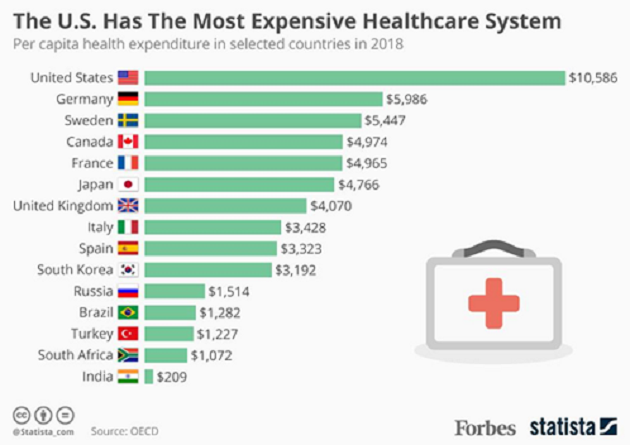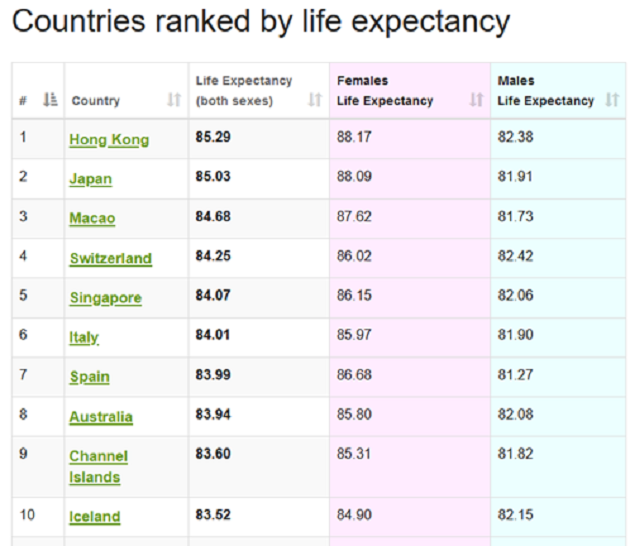
By Patrick Watson*
Even in normal times, the news describes murders, accidents, wars, natural disasters, and the passing of once-famous celebrities.
Those deaths are usually just headlines. We don’t know the people, and we don’t expect to share their fate anytime soon. We note them and move on.
Ignoring the death news isn’t so easy in a pandemic that could sicken and possibly kill any of us, at any time. Yet people manage to do it. Some think it’s all exaggerated or fake. But even those who see the threat often tune out the news. They’d rather not think about it - and understandably so.
The virus doesn’t care what people think. It will, if given opportunity, try to infect them. A small percentage of those infected will die. Will others care?
Sadly, I think many won’t. Millions of us have been ignoring needless death for years.
Revised possibilities
When the COVID-19 case count turned higher in mid-June, President Trump and others said not to worry. It was the result of more testing, and deaths were still falling.
Neither of those proved right. New cases rose faster than testing, and people take a few weeks to die. And sure enough, the daily death totals turned higher in early July.
Now, the percentage of patients who die is indeed falling as doctors learn how to treat the condition. But with many more cases now, we are still going to see a lot more death this summer. Then we get to fall and flu season, which could be even worse.
Two months ago in The Great Reopening Gamble, I described the four possible scenarios we face, based on the answer to two questions.
- Will the virus recede?
- Will the economy improve?
I said back then we would know more in a few weeks, and we do. Instead of receding, the virus is spreading faster. That eliminates two of the four scenarios. Here’s where we are now.

Scientists are working on vaccines and better treatments, so maybe things will get better. But any such breakthroughs are probably months away, and maybe longer.
What does that mean economically? It depends on how people react.
So far, most governors don’t seem likely to reimpose the kind of stay-at-home orders we saw last spring. So some folks will go about their business (hopefully wearing masks), making the economic damage relatively less severe.
But their behavior could also intensify the problem. Even a few carriers can spread the virus enough to offset any economic boost they create.
Somewhere in there is a tipping point, and the deciding factor is how much death will Americans accept?
The answer, I’m afraid, is “a lot of it.”
Worst choices
Almost from the start, some have framed this crisis as a polar struggle between protecting public health vs. protecting the economy.
I think that’s a false choice. The economy can’t thrive until we control the virus. But surely no one wants to lose both those battles, harming our health and our economy at the same time.
Don’t be so sure.
Here is a chart I shared last September, comparing US healthcare costs with other countries. These are 2018 numbers but probably still close.

You can see we spend far more per person on healthcare than other countries. It’s not even close.
Even before the pandemic, this money wasn’t making us any healthier. Here are the top 10 countries ranked by life expectancy, according to the latest United Nations data.

You don’t see the US because it is way down the list at #46. On average, our lives are shorter than people in advanced economies like Japan, Switzerland, and Australia. We are also behind less-advanced countries like Cyprus, Maldives, and Lebanon.
The average American lives almost five years less than the average Italian even though we spend three times as much on healthcare, per capita. Multiply those five years by 330 million Americans, and we’re losing a lot more life-years than other countries, and it’s not even saving us any money.
In other words, the US was letting people die prematurely, and hurting our economy in the process, long before COVID-19 came along.
That’s a choice, not an accident. The solutions are well known. We could save those lives if we wanted to. We don’t because many Americans have other priorities.
So if the pandemic death toll worsens, as seems likely, I would not assume that the public will do what is necessary to stop it. Some will, yes, but not all.
That means we will continue diverting economic resources to unproductive uses and our economy will have a hard time recovering, much less growing.
Meanwhile, other countries (like China) that have handled the virus better will move ahead without us.
That is why I said The Corona Depression Is Here. I hope to be wrong. But I don’t think I am.
*Patrick Watson is senior economic analyst at Mauldin Economics. This article is from a regular Mauldin Economics series called Connecting the Dots. It first appeared here and is used by interest.co.nz with permission.
8 Comments
Well this headline says it all for the US, perhaps Trump should have acted more responsibly as a President not a toddler who refused to wear a mask to set a good example. Instead he decided to turn mask wearing in to a political issue, which has massively back-fired on him making him look very weak as a president. BBC article: Trump concedes pandemic to 'get worse before it gets better'.
"Mr Trump also asked all Americans to wear face coverings, saying "they'll have an effect" and show "patriotism". He was not wearing a mask at the briefing, but has previously downplayed such personal protective equipment. The president's aides have reportedly asked him to adopt a new tone as virus caseloads spike across the US. https://www.bbc.com/news/world-us-canada-53494766
This virus business is a real challenge - to all nations. Apart from Taiwan, nobody has done it well from what I can understand. With hindsight I think we're doing as well as anyone & I've been pretty hard on JA & co for not getting the borders & quarantine sorted earlier. It has fundamentally changed travel & tourism, a big part of many economies, including our own. We're in the events & hospitality industries, which is the next step up from travel/tourism so we know what's happening out there & a lot of it is hurting. Where to from here is anyone's guess, certainly Labour & National & co have no idea, that's obvious. Perhaps this is the moment in time where somebody stands up & tells it how it really is? The problem here is whoever stands up going to be booed off the stage, as we've lost the respect of our political leaders & their systems, and not just here in NZ either. The hard part to swallow suggests we've got the most to lose. Democratic nations generally have healthier populations with lots of choices, especially when we compare that with what the other three quarters of the planet's population has. Many other nations have less to lose & more to gain by using this disruption to their advantage, so we're going to have to be both careful & probably prepared to go & defend what we've created, if we want something similar to come out the other side. Yes, I know there are many, even here, that will take issue with that, because what we've got is not perfect, but be careful what you wish for. I wanted unlimited immigration into NZ to stop - and it has - but even I'm not that pleased with the way it has played out. Sigh.
Good post.
It's a tricky time, eh. Information has been so weaponised, expertise and science denigrated, opinion held up as just as valid as facts, and superstition leveraged for political gain through promoting conspiracy theories. Anti-intellectualism indulged in far too much, for the benefit of those with power.
Dirty politics has weaponised information and manipulated populations perhaps more than we'd seen for several decades.
The malaise long common on Facebook is even spreading to LinkedIn these days.
How do reinvigorate thought and criticism in NZ, and have that flow back into political discourse?
And guard against encroaching corruption...
Despite any contributors on here being essentially National voters, we all have to admit (rationally) that there is a correlation between having the virus under control and how well the economy does. An economy will not function at all well while the pop is walking around in fear or hiding at home due to fear. In NZ we no longer have that. Most other countries do and mostly because they did NOT do FULL lockdowns but fannyied about ding a bit of both which does not work, with inconsistent messaging and non-compliant and non consenting populations. So, now NZ has a great advantage and having acquired that , means Labour will win the coming election easily. National has no wriggle room: they dislike government spending and debt, which at present is v necessary; they like immigration and want orders open which is not what most people want at present or in next 5 months minimum; they want tax cuts, which makes deficits worse. They have a nasty leader and that alienates the middle female 25% of voters who Labour is cultivating daily and who like Jacinda. National and Labour suffer from a worldwide deficiency of political talent and vision, which is a generational thing, primarily the generation aged 40-60 who thus far are not stepping up with much new to say or do as policy direction. That will have to change and soon or the world will find itself in depression and war for many years to come.
I'm starting to think that the lack of talented politicians stepping up is due to the greatly increased publicity and accessibility people in such positions get in the 21st century. I can't imagine what's it like to receive hundreds of death treats and nasty messages on a weekly basis from idiots simply for being a politician "on the wrong team", or of "the wrong gender". And it's no longer limited to just the politician - their whole family life is public and anyone can send an email to, say, the husband of the PM.
For the vast majority of the 20th century, politicians only had to deal with the people they met in person - and they always had a way to hide from the public. I bet there are a lot of smart and talented people who want real change - but decide not to get into politics because it could easily ruin their lives.
The virus rips through the elderly and largely spares those under 50. It has evolved to be asymptomatic for most people, enhancing its spread potential but not harming most hosts.
It is nature's attempt at a population cull, and to be honest it's a lot "fairer" than most of the plagues we've been dealt in the past, or horrible diseases that maim children for life. 80, 90, 100 year olds dying is unfortunate but it's not a tragedy. We need to segregate them off while getting on with life and waiting for a vaccine.

We welcome your comments below. If you are not already registered, please register to comment.
Remember we welcome robust, respectful and insightful debate. We don't welcome abusive or defamatory comments and will de-register those repeatedly making such comments. Our current comment policy is here.